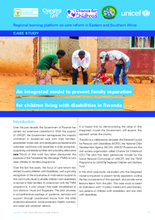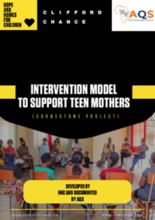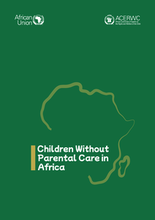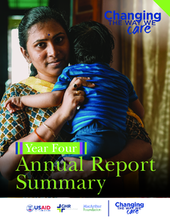This country page features an interactive, icon-based data dashboard providing a national-level overview of the status of children’s care and care reform efforts (a “Country Care Snapshot”), along with a list of resources and organizations in the country.
demographic_data
childrens_living_arrangement
children_living_without_bio
adoption
social_work_force
key_stakeholders
Key Stakeholders
Add New DataOther Relevant Reforms
Add New Datadrivers_of_institutionalisation
Drivers of Institutionaliziation
Add New Datakey_research_and_information
Key Data Sources
Add New DataReport on National Assessment of Centres caring for Children with Disabilities in Rwanda
National Integrated Child Rights Policy
Country Care Review: Rwanda
Prevalence and number of children living in institutional care: global, regional, and country estimates
The Way Forward Project Report
Community-Based Child Protection Mechanisms in Refugee Camps in Rwanda: An Ethnographic Study
Displaying 1 - 10 of 191
The Early Childhood Development Action Network (ECDAN), together with the Government of Rwanda, UNESCO, UNICEF, WHO, and the Africa Early Childhood Network (AfECN), is hosting Investing in the Early Years: A Global
This video explores efforts to enable children with disabilities in Rwanda to grow up in safe and caring families using an integrated approach which saw collaboration between the child protection, health, education and social protection sectors.
Over the past decade, Rwanda has reformed its care system to prioritize family-based care, with recent efforts focusing on supporting children with disabilities through a multi-sector, community-based approach. This short case study explains why this integrated model is important to prevent family separation, outlines the key components of this approach, and provides some lessons learnt from the pilot.
The Teenage Mother project is an intervention model to support teen mothers, developed by Hope and Homes for Children (HHC) in Rwanda. The documents provides an in-depth analysis of the challenges faced by teen mothers, the prioritization of causal factors, and the implementation of the Active Family Support (AFS) model to address these challenges.
An army of trained foster parents are transforming the lives of children who have suffered terrible hardships after being abandoned in institutions
This webinar explored the importance of working across sectors to enable effective care reforms. Speakers focused in particular on work with social protection and education sectors, drawing on examples from Kenya, South Africa, Uganda and Rwanda.
Charity says children could be deported as adults before age can be formally determined.
In this episode Amanda Griffith of Family for Every Child is joined by representatives of three member organisations who are working to support children's mental health and wellbeing across three continents.
The African Committee of Experts on the Rights and Welfare of the Child (ACERWC/the Committee), in collaboration with African Union Member States, partner organizations, children and young people, launches the first of its kind Continental Study on Children Without Parental Care (CWPC) in Africa. The study, conducted from 2020 to 2022, amid the COVID-19 pandemic, covered over 43 countries in the five regions of Africa.
Changing the Way We Care (CTWWC) promotes safe, nurturing family care for children reintegrating from residential care facilities (often referred to as “orphanages”) and prevents child-family separation by strengthening families, reforming national systems of care for children, and working to shift donor and volunteer support away from residential care and toward family care alternatives.




